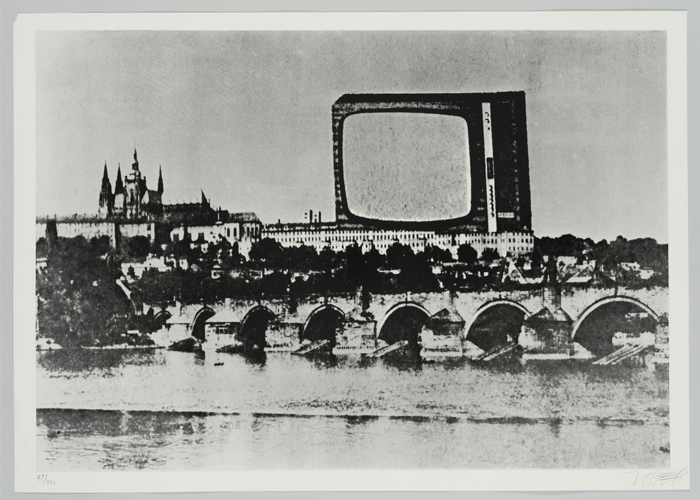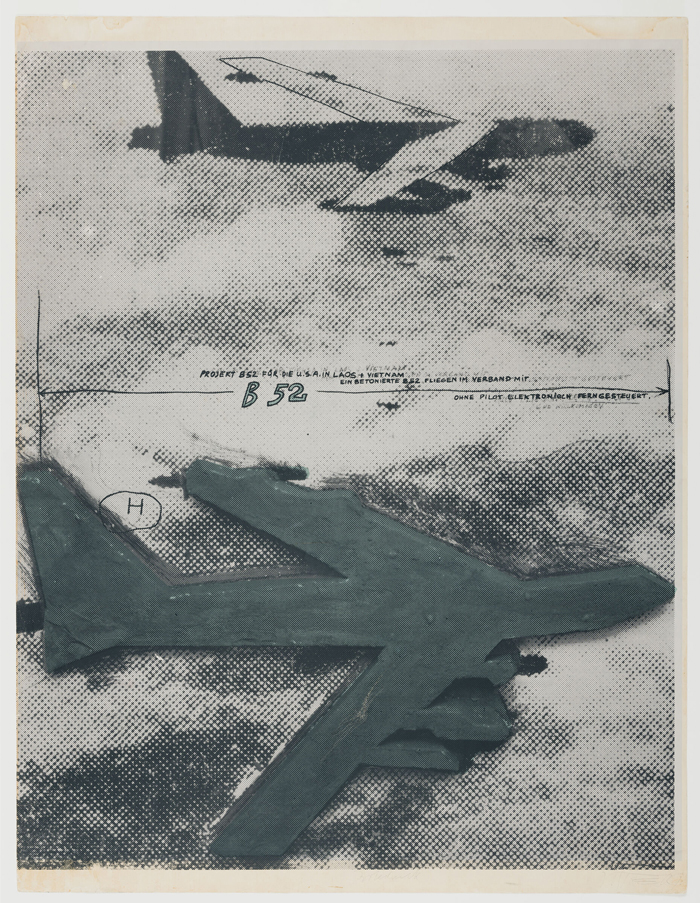
19.75″x27.6875″; screenprint on paper; 1969. Harvard Art Museums/Busch-Reisinger Museum, Gift of The Wolf Vostell Estate 2022.299
COLLAGE ON VIEW
Wolf Vostell: Dé-coll/age Is Your Life
at the Harvard Art Museums in Cambridge, Massachusetts, USA
20 January-5 May 2024
“Dé-coll/age Is Your Life” presents works by German Fluxus artist Wolf Vostell (1932-1998), whose aesthetic philosophy of “dé-coll/age” employed the use of destruction in art to generate consciousness of destruction in life. The exhibition includes prints, films, multiples, sculptures, artist publications, and performance ephemera drawn primarily from the Busch-Reisinger Museum’s collection, the largest repository of the artist’s work in the Americas. Works by Vostell’s Fluxus collaborators and other peers who employed destructive methods in their work—including Joseph Beuys, Alberto Burri, Hy Hirsh, Nam June Paik, Benjamin Patterson, and Gerhard Richter—are also part of the exhibition.
A child of a Sephardic Jew who witnessed the brutality of World War II and its aftermath in Germany, Vostell committed his artistic practice to remembering the atrocities of war, violence, and genocide. Confrontational and unsettling, his art resists the cultural erasure of human suffering and cultivates collective awareness of and resistance to the violence of past and present. Nuclear warfare, Cold War aggression, technological disaster, environmental devastation, and above all, the genocidal acts of the Nazi regime shaped his understanding of aesthetics. One of the first German artists to address the Holocaust after World War II, Vostell felt an urgency to prevent future catastrophe. Working in a variety of mediums, he jolted spectators from complacency, dismantling mechanisms of mass media and consumerism that numbed individuals to violence and human suffering.

34.625″x28.5625″; screenprint on paper; 1970. Harvard Art Museums/Busch-Reisinger Museum, Gift of The Wolf Vostell Estate 2022.304
Décollage—meaning “to unglue” or “to take off”—describes the artistic process of ripping layered street posters to reveal poster fragments underneath. Vostell associated torn street posters with war-ravaged landscapes as well as destructive events and technologies of the 20th century. He appropriated the term as a comprehensive concept for his art, stylizing it as “dé-coll/age” to emphasize destruction as a creative process.
Vostell initially lacerated posters to excavate references to the Nazi regime and postwar German society. Adapting techniques of dé-coll/age to other media, he manipulated magazines, newspapers, and television images to decry international geopolitical conflict and technological warfare. Central to his practice were dé-coll/age happenings, participatory group events that staged symbolic confrontations with destruction to incite spectators to become critical actors in their own lives.
The exhibition was curated by Kyle Stephan, the 2021–23 Hakuta Family Nam June Paik Curatorial Fellow in the Division of Modern and Contemporary Art at the Harvard Art Museums. Loans have generously been provided by the LWL-Museum für Kunst und Kultur, Münster, as well as Harvard University’s Fine Arts Library and Houghton Library.
(text adapted from materials provided by the museum)
INFORMATION
University Research Gallery
Harvard Art Museums
32 Quincy Street
Cambridge, Massachusetts 02138 USA
(617) 495-9400
Hours:
Tuesday-Sunday, 10AM-5PM
